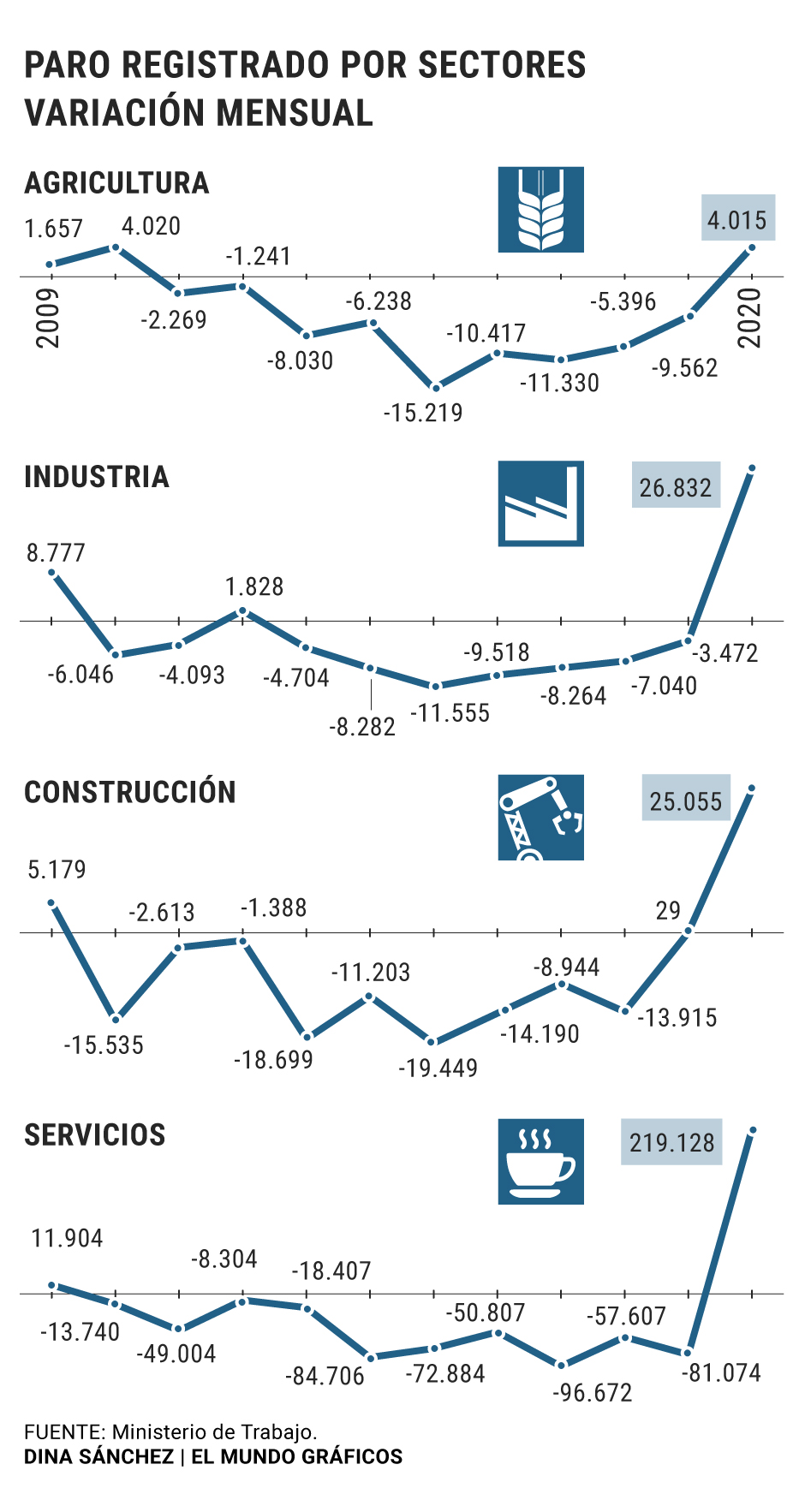There are strawberries to pick up in Huelva and peaches and stone fruit in the Ebro Valley. There are also buses and VTC vehicles to drive or sanitary facilities to clean. But all of these jobs have a hard time finding the workers to fill them. In the countryside or in the city, the emergence of the coronavirus pandemic has led the Spanish labor market to a reversal, with more employees than ever teleworking and almost eight million unemployed or unemployed but covered with benefits.
The state of alarm and the limitations to mobility have altered the equilibria of a labor market such as the Spanish one , which if it is defined for anything is precisely because of its imbalances, especially temporary hiring. The health alert has restricted the arrival of immigrant labor to the field and employers have pointed out the lack of up to 130,000 workers to cover the harvest schedule . In other sectors, the closure of hotels has meant that hundreds of thousands of room maintenance or service contracts for the more than 80 million tourists expected this year have been left unsigned. Meanwhile, in other activities there are problems finding staff to take care of cleaning the facilities.. Waiters prefer to be transporters , cleaners do not easily change an office for a hospital and, in the field, it is difficult to complete the immediate incorporation offers for full time without the need of experience as a collector or packer .
"There has been a very large inequality affecting sectors," explains Rubén Castro, Adecco's National Director of Sales . Thus, while hospitality and car jobs have reduced their activity to a minimum, the agri-food sector, the health sector, technology companies and healthcare services are at the opposite extreme.
Temporary workers, that flexible and often precarious workforce that occupies millions of jobs that usually have no problem being filled, leave offers unfilled. How can it happen in the second country of the European Union by number of unemployed, the one that walks with firm step towards the four million unemployed? "It is very difficult to find a job offer that nobody wants to cover," says Javier Caparrós, director of the Permanent area at ManpowerGroup, "what there are are conditions, not just wages, that you don't want to accept . "
The offer of jobs that cannot find workers was already taking place before the pandemic, but had no visibility. Beyond risk or precariousness, a classic prior to the pandemic is jobs that require degrees that are much higher than the function, such as that of computer engineer for a user service position or three languages and a university degree for a dependent in a Commerce. It also happens with middle managers for companies whose activity collides with the values of the candidates, be it for health or political reasons. "In the current climate, there is a lot of reluctance to positions linked to public service parties that can leave a mark on the professional in his working life."
Now, the confinement and economic hibernation that have 40% of the working population unemployed in the second country are more unemployment in the European Union behind Greece, making the rejection of job offers more striking. The clearest case is that of rural tasks, where the arrival of the 250,000 immigrants affiliated to the sector in the months of May has been halted and the conflict that was unleashed in February due to the rise in the Interprofessional Minimum Wage (SMI) remains active. ) between employers and the Government. Last Thursday, the Labor Minister Yolanda Díaz announced the opening of inspections to punish working conditions in the agricultural sector. The farmers, in the midst of the spring harvest campaign and with a hiring bag of between 100,000 and 150,000 workers according to the Asaja management, asked for his resignation. "This is not Africa or any dictatorship where people are in a slave plan. Is it that we are crazy?", Criticized COAG Andaucía.
Emilio Terrón, secretary of the Agrarian sector of the UGT, has a very different point of view. "The reality is that there is no lack of labor," he says, recalling that the strawberry campaign in Huelva, where 16,000 immigrant workers were available last year, has had this year 6,000 who crossed before the closure of borders. "And it has been collected without problems, right now there are people there without work." The agrarian sector in this province has been brought to trial by the unions for not applying the SMI. "What there are not is people to work in the conditions that are offered: if you don't give me 48.54 euros of SMI a day, I'm not going."
Large temporary employment agencies do not offer their services in this sector. But Caparrós points out that all those jobs exposed to the pandemic have greater difficulties to be covered. Indeed, he recognizes, the salary is a critical point if the margin for improvement over what is paid with a benefit is minimal. It happens in industry or commerce if the job offered requires travel, shifts that prevent reconciliation, rotations ... Remember that the benefits model in some countries requires that you are actively seeking employment, going to cover offers . But he points out that the rest of the conditions that are offered in a job in addition to the salary (training, possibilities of improvement, social sense of the work that is carried out ...) are very relevant for the jobs to be covered.
In accordance with the criteria of The Trust Project
Know more- Aragon
- Huelva
- European Union
- Unemployment
CoronavirusThe bill for ERTE, unemployment and aid to companies amounts to 11,000 million since March
COVID-19Only 11 million people keep their employment in the private sector intact after the impact of the coronavirus
Employment There are already 9 million workers in economic unemployment

